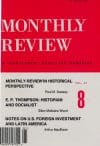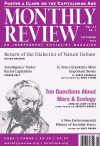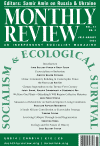2022

In the past and in his own time, Marx has been portrayed as endorsing the enclosure of the commons as a necessary historical stage on the path to socialism. However, a more accurate account, one that is critical of the enclosure movement, can be found in his response to the destruction of commons-based peasant communities in Russia—while it was actually happening. | more…

The Soviet Union’s efforts at centralized economic planning suffered greatly by neglecting to integrate cybernetics into a comprehensive model. Today, this cybernetic approach to economic planning is still blocked. The time has come to implement alternative planning in the form of an automated model that coordinates the activities of all industries and sectors of toward a prosperous and sustainable future. | more…

New York City is facing a crisis in its urban ecosystem. As wealthy developers and real estate mega-projects rupture the connections between people and the social and spatial webs making up the city’s once-rich undergrowth, how can city-dwellers nurture and restore their metropolitan habitat? | more…

Revisiting the Bonn Notebooks
There is hardly any theme in Karl Marx’s theoretical corpus that has garnered as much traction as his theory of fetishism. Ever since Marx introduced the term into his critique of political economy in Capital, fetishism became a field of theoretical force. While much ink has been spilled on the specific content and theoretical scope of fetishism in Capital, young Marx’s initial exploration of the term has rarely enjoyed critical attention. | more…

Monthly Review was started in 1949 and is now in its forty-fourth year of publication, so you could say that MR‘s existence is pretty much coterminous with the second half of the twentieth century. What have been the most important characteristics of this half century? | more…

Our current geological time period, characterized by drastic planetary shifts due to anthropogenic climate change, is popularly known as the Anthropocene Epoch. Recent proposals for naming the first age of this epoch highlight capitalism’s central role in the ongoing climate crisis. | more…

More than twenty years after the publication of John Bellamy Foster’s Marx’s Ecology (2000), ecosocialist scholars continue to explore the evolution of Marx’s ecological thinking, from the Greek atomists to his later work on ethnology. | more…

John Bellamy Foster’s recent work, The Return of Nature, makes a strong case that Marxism’s central, materialist conception of nature and history makes it the best possible theoretical basis for radical ecological scholarship. | more…

For nearly sixty years, H. Bruce Franklin has built a body of work that touches on everything Herman Melville to the military-industrial complex to a lowly, little-known fish that is a historical keystone of the U.S. fishing history. | more…

From the era of overt eugenic research to the present-day education system, the attempts to categorize and rank individuals’ “intelligence” through testing and statistics reflects and reinforces the power of racist, capitalist, and imperialist institutions. | more…

Recent scholarship suggests that the widespread perception of Soviet states as uniquely ecologically disastrous is, at best, exaggerated, and that these environmental legacies must be re-examined. | more…

Between 1949 and 1980, over a hundred articles in Monthly Review dealt with the Soviet Union directly, with many more addressing it indirectly. But, after 1993, treatments of post-Soviet Russia in the magazine largely ceased. | more…

Time is running out for humanity to avoid a catastrophic planetary tipping point. Widespread mass mobilizations of populations worldwide must fight to bring about revolutionary societal changes and dismantle neoliberal monopoly capitalism, with its reliance on extractive exploitation of our planet’s resources and communities. | more…












